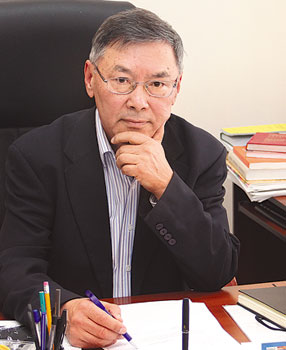Kazakhstan is forging ahead to become a regional and global leader in developing solar power and other sustainable energy technologies.
 On March 7, a pilot line for the production of solar modules was launched at the Kazakh National Technical University (KazNTU).
On March 7, a pilot line for the production of solar modules was launched at the Kazakh National Technical University (KazNTU).
In the new national Strategy 2050 that he unveiled on December 14, President Nursultan Nazarbayev set the important goals of raising scientific research studies in the country to the international level and to ensure the effective integration of Kazakh scientists in the world scientific process. Work in this field has already started and Nazarbayev University is working in accordance with international standards as a system guide. These standards will then be shared with other universities of the country, especially research universities and those specializing in technological innovation, research and development like KazNTU.
Innovative approaches and technologies at our institution are designed to train highly qualified specialists for the accelerated industrial and innovative development of Kazakhstan.
KazNTU prepares bachelors, masters and PhD degrees in different fields of engineering, economic studies, and science in seven research and educational subdivisions that have the status of institutes. All of them deliver educational services at an international level and relevant research to meet the needs of the domestic economy. They prepare competent professionals and education students of high potential.
Our work is guided by the national Development Strategy for 2011-15. We have set up a new Institute of High Technology and Sustainable Development at the initiative of KazNTU Rector, Academician Zheksenbek Adilov.
Bachelors, masters and PhD students are trained on the most topical fields of science and technology including nanotechnology, space, nuclear research and technology, the environment, energy-efficient technologies, biotechnology, applied chemistry, applied physics and teachers training for vocational education.
Our institution contains modern equipment. Notable scientists from the United States, France, Germany, Portugal, Russia and other countries come to give lectures and conduct joint research.
We have introduced elective courses in foreign languages into our curriculum, and operate exchange programmes for our students and faculty with other universities around the world. In the first semester of the current academic year, more than 10 students from our institute have undergone training at U.S., European and South Korean universities.
Today it is possible to get an internship without going abroad. Many foreign companies operating in Kazakhstan offer such programmes to KazNTU students in the fields of energy, electricity and maintenance of automated systems.
KazNTU also operates joint programmes within the country at high tech centres such as its Kazakh-French educational centre where Schneider Electric equipped the classrooms. SE is one of the leading providers of electrical and power equipment in the world.
Our Master’s Programme in Industrial Ecology is conducted in partnership with the Sweden Royal Technical Institute, the Delft Technical University of the Netherlands and the Polytechnic University of Catalonia in Barcelona. Leading specialists of KazNTU’s Applied Ecology Department participated in a series of workshops in these universities and prepared the curriculum for our students. This programme will give a constant flow of qualified experts to develop the green economy in Kazakhstan.
KazNTU also cooperates fruitfully with the scientific and technical centre of thin-film technologies of the Ioffe Physical-Technical Institute of the Russian Academy of Sciences in the field of renewable energy.
KazNTU has already launched a pilot production line of solar modules that are competitive in the marketplace. The university is encouraging internships in innovative parts of the energy sector.
Our masters and PhD graduates undergo a one-year internship at the University of Texas in the United States where they are introduced to the latest developments in solid oxide fuel cells and conduct scientific research in this field.
Other graduates receive further training at the Institute of Science and Technology in South Korea, where they work in basic and applied research to develop high-efficiency solar photovoltaic generators. These fields are extremely important for Kazakhstan.
Today’s fuel cells have an efficiency of 60-80 percent. Experts believe this level can be improved and that fuel cells will be widely used and will be able to compete with conventional electric generators. Therefore, this technology may become one of the most important aspects of developing sustainable future energy.
KazNTU also carries out researches in the field of nanophysics and nanotechnology in its Centre for Nanotechnology and Engineering Laboratory where its scientists have already obtained results of global importance.
They have used magnetrons, ion-plasma deposition and subsequent thermal annealing to obtain a polycrystalline hetero-junction based on oxides of copper and zinc with unique electro-physical characteristics. This will have important applications in nano- and micro-electronics. Based on the theoretical analysis of the crystal structure of zinc oxide and copper, our scientists are seeking to prove the feasibility of a hetero-junction between substances with different crystal structures for the first time.
Hydrothermal and sol-gel techniques are being used to modify thin layers of oxide and zinc sulfide for use in solar photovoltaic power generators. These layers have a nano-crystalline structure, which has been confirmed by atomic-power microscopy and X-ray analysis. According to the measurements of the spectrum transmission in the visible scale of wavelength, the transparency of the layers reached 85 percent. This substance is expected to have practical applications as transparent electrodes.
KazNTU will present some of the results of its research in green energy at the second International Conference on “High Technology – Key to Sustainable Development” in May. It will bring together scientists from Kazakhstan and around the world to discuss issues of sustainable development, space technology and research, information technology and telecommunications, nanotechnology and nanostructured materials, energy efficiency and renewable energy, industrial ecology. The conference will also explore the participation of KazNTU and other institutions in EXPO 2017.
The author is the director of the Satpayev Institute of High Technology and Sustainable Development at Kazakh National Technical University
